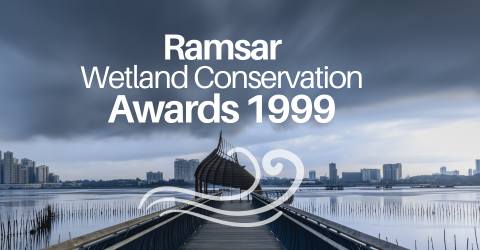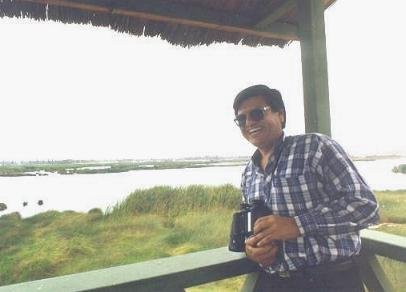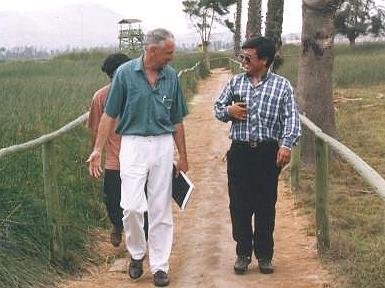
Individual Award 1999 - Victor Pulido

Victor Pulido, Peru
A leader of the wetland conservation movement in Peru for the past 20 years, Victor Pulido has worked indefatigably, first as a government official, then as a private citizen, to ensure the conservation and wise use of the wetlands of Peru. The Award is presented to Mr Pulido in recognition of a life of dedication to wetland conservation and wise use against a background of economic and social challenge.
Mr Pulido’s technical work laid the basis for the designation of Ramsar sites in Peru. In his position as Director of Protected Areas in the 1980s, he secured the protected status of many sites, including the Lagunas de Mejía Ramsar site.
In spite of difficult economic and social circumstances, Mr Pulido achieved funding for the Wetland Programme of Peru, a model of cooperation between the public, private, and academic sectors. This programme is a model of participatory multi-disciplinary wetlands management and also forms the National Ramsar Committee for Peru -- under his leadership since 1992, it has made significant achievements for wetland conservation in Peru, including the elaboration of a National Wetland Strategy.
An Astonishing Man
by Guillermo Giacosa
When he told me that his first job as a professional was to collect owl droppings during a whole year, I realized that something was different. I am familiar with sword-swallowers, fakirs and even a child who prefers the computer to playing with friends, but this was beyond what I expected and confirmed the certainty that the world will never stop spinning out of boredom, at least as long as there are people like Víctor Pulido.
He is a biologist more out of love for life than any scientific inclination and reached biology after dealing with forests and poets. He knows the pleasure of being alone that the forests, the Andes and the deserts in his native country offer.
Peru produced important civilizations at a time when Europe had still not yet know the splendor of the Roman Empire, and it is a propitious place to appreciate the richness and the importance of nature.
In the 1970s, when ecology was still a word with which we were just beginning to become familiar but still didn’t always use correctly, Víctor began to study biology – a field of which his family disapproved – at the Universidad de San Marcos. They wanted him to become a physician, but he, deeply given to the solitude of contemplation and carrying out research alone, chose a discipline that drew him to birds, the admirable creatures that he has never stopped studying.
His professors found in Víctor the ideal assistant for their field work. For him it was an opportunity to learn about the diverse geography of his country, the wide variety of wild fauna and flora for which Peru is a privileged place, and the cultural diversity of the inhabitants. After graduation, he began working for the Department of Forestry and Wildlife (Dirección General Forestal y de Fauna) of the Ministry of Agriculture, where he was delighted to be paid to continue to do research on his burning passion: Peru. In 1980, the inhabitants of Mejía requested the Ministry of Agriculture to declare Las Lagunas de Mejía, in the province of Arequipa, a sanctuary. It is populated by many species of birds, a large number of which are migratory. This was Víctor’s first official assignment in the Ministry of Agriculture.

The 1980s
His work as an ornithologist gave him an insight into the value of wetlands for wildlife conservation, and it was because of his work that Los Pantanos de Villa, Manglares de Tumbes, and Las Lagunas de Mejía are included as three of the seven Ramsar sites currently in Peru. Later, he was named director of national parks during a period of crisis and repeated strikes.His complete lack of bureaucratic attitude, and his full awareness of the complexity of the challenges he dealt with, allowed him to overcome the inconvenience caused by the occupation of government offices by employees and workers, handling his business in a café near his office. Everyone knew that during the crisis the director could be found throughout the day, uncomfortably installed but available at a certain table in such and such a café. His atypical and informal attitude contributed to improving confidence in a public official who certainly did not fit the public’s image of government officials. He promoted the establishment of Los Pantanos de Villa as a nature reserve, a protected area of national importance and now recognized internationally as one of the main migratory corridors for birds on the Pacific Coast. This routine decision in the 1980s gave rise to a conflict that is still alive today, opposing a large segment of the community and various NGOs against a powerful transnational company that has installed a modern pasta factory which, according to experts, over-exploits the water in the wetland, threatening the survival of the wild fauna and flora that live there and leading eventually to its drying up.
Víctor Pulido, loquacious and contemplative of nature, has not stopped fighting for his principles. He knows that no slack can be given in the face of power and money. He has become a symbol of the protection of Peru's national heritage and such a vigorous defender of them that his opponents have attempted to frighten him in order to sap his enthusiasm. But they do not know Víctor. He has accumulated so much energy and serenity from the solitary observation of birdlife. He has persevered to the surprise of his opponents and has not hesitated when confronting obviously petty human beings and their purely financial interests.
There is an old Russian proverb that says: "Whoever suffers does not love. Love him who protests." Víctor, like so many others in this part of the world where injustice is omnipresent, is neither surprised nor intimidated by continual challenges that force him to abandon his life's leitmotiv forged by observation and study, that involve him in struggles and confrontations to save Peru's rich natural heritage.
At the beginning of the 1980s, Víctor made his voice heard in the bitter confrontations opposing conservationists and developers. He admits that "we had not yet gone beyond dogma to reason." He feels, nonetheless, that these sometimes exaggerated conflicts were useful because they served to bring to the public's attention a debate that under other circumstances would have remained in the reserve of the specialists. He adds, "The ideas of our opponents, even as absurd as they may appear, end up contributing to our own growth." His democratic inclinations and respect for his fellow beings do not prevent him from expressing his outrage and force him to speak out in the face of constant aggression against the environment.
In the 1980s, Víctor Pulido created and began publishing "El Volante Migratorio," a publication dedicated to the promotion of the conservation of wetlands and migratory birds, which had the merit of reaching all of Latin America at a time when the Internet was still a utopia. In 1992, in spite of the difficult social and economic circumstances that the country was going through, Víctor Pulido created the Wetlands Programme of Peru (Programa de Humedales Perú) that became a paradigm of cooperation among the academic, public and private sectors. This programme, a multidisciplinary model of participation in the management of wetlands, became the National Ramsar Committee of Peru, which under Víctor's leadership has made an important contribution to the conservation of wetlands and prepared the way for the National Wetlands Conservation Strategy for Peru, the first of its kind in Latin America.

The Ramsar Award
Víctor Pulido will share this award with a Russian scientist, and he is delighted by this fact. He has always been a passionate reader of Dostoevsky and Tolstoy, who led him to dream of someday seeing the steppes and tundra of Russia. While he was not ignorant of his own merits, he was unaware that these merits would make him worthy of an award. When he learned about this, his surprise was enormous. It was comparable only to his pleasure, because he well knows that in countries on the periphery of the developed world international recognition increases the range and the importance of the voice of the beneficiary of an award. His struggle will now have more support and, although it might temporarily take him away from his dearest calling, he knows that his work prepares the ground where others will flourish.
The unexpected in the life of Víctor Pulido
As an example of his surprise at receiving the Ramsar award, Víctor told us a story from his childhood that left an indelible mark on his memory. As many other Peruvians, Víctor admires to the point of devotion the writer José María Arguedas, who represented and still represents a clear but painful vision of the world of the Andes. Many see in him a lucid, passionate interpreter of the local reality, and youth of that period, among them Víctor Pulido, felt a fervour for Arguedas, who combined an intimate love of the land with the political objectives of recognition of ethnic rights and social justice.
The only direct contact between the young Víctor, at the time only fifteen, and the writer José María Arguedas took place under chance circumstances in the emergency room of a modest hospital. Recovering from acute dehydration, Víctor noticed with concern another stretcher next to him with someone who appeared to be dying. In the state he was in, he had the nightmarish impression that his potential roommate was remarkably identical in appearance to his idol, José María Arguedas. It didn't take him long to understand that it was not a hallucination, but, in fact, the patient was the famous writer who in a moment of deep depression had shot himself in the head.
A man who astonishes
In Spanish, "pulido" means immaculate, conscientious in behaviour; and this is exactly part of what Víctor is, but only a part. His surname does not reveal that in addition he is a passionate human being combining a relentless struggle for defending nature with a deep love for poetry and an unusual aptitude for communicating ideas, as well as a gift for making them understandable even to those who are only slightly open to his ideas.
Although the Ramsar Award surprised him, he, with modesty but not without pride, and all Peruvians, with pride that need not hide behind modesty, know that this award is in good hands and that it is certain to serve to empower further his very important work.
-- translated from the Spanish original by Charles Akin